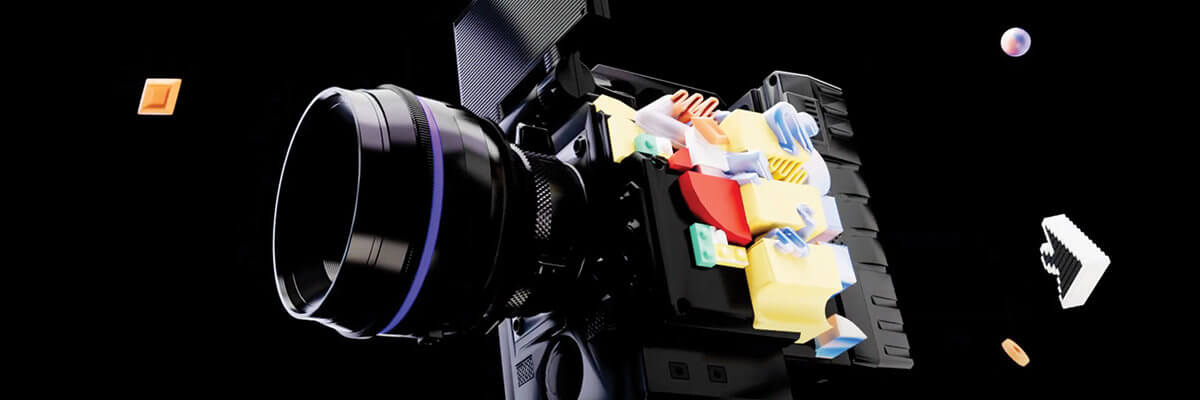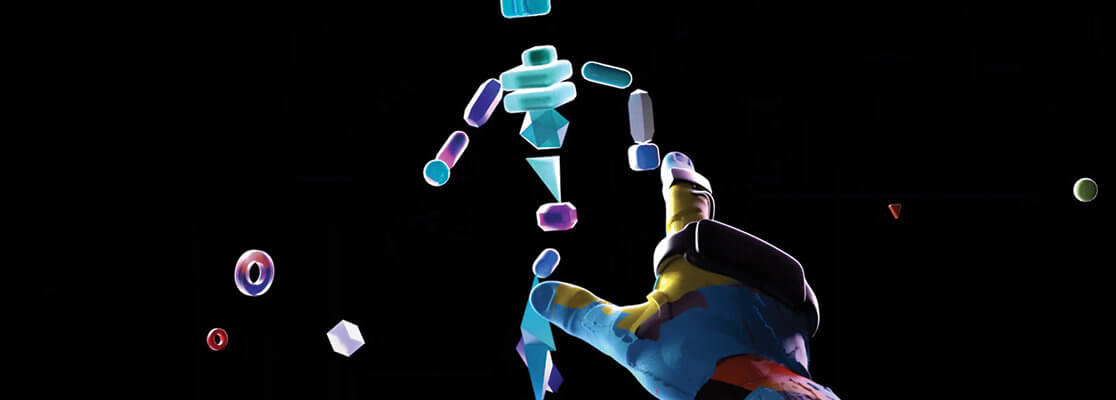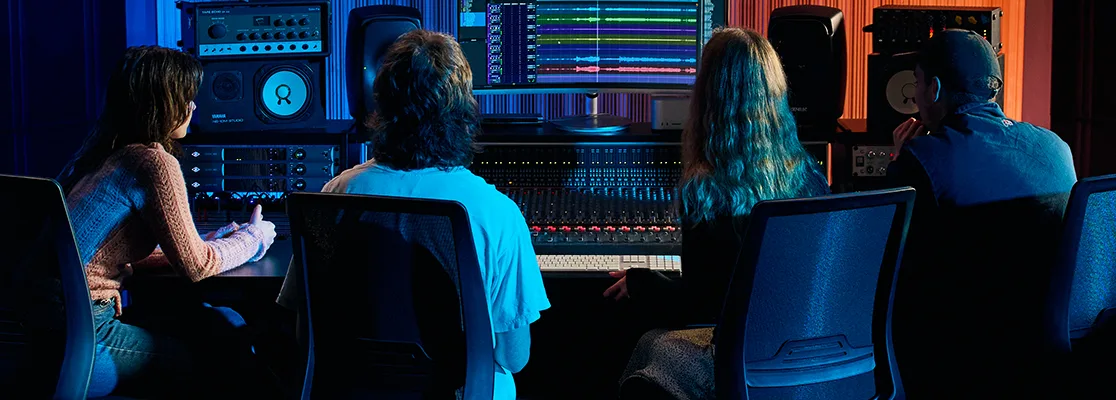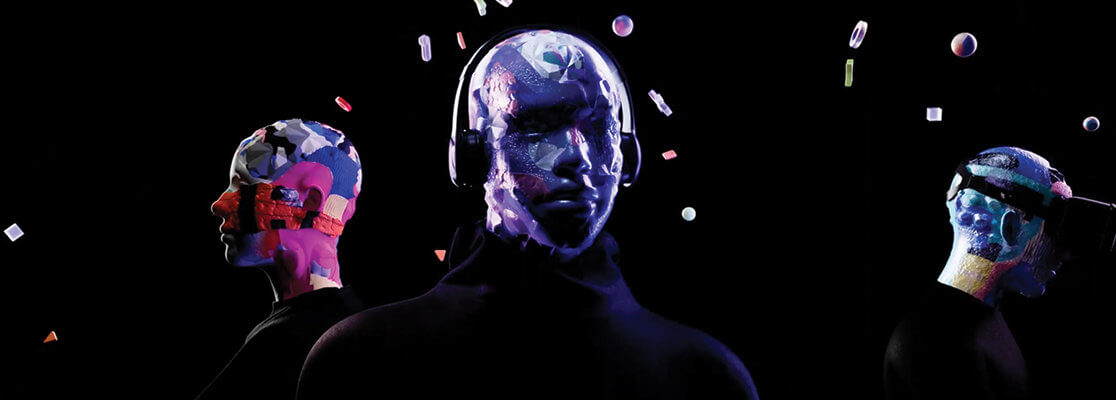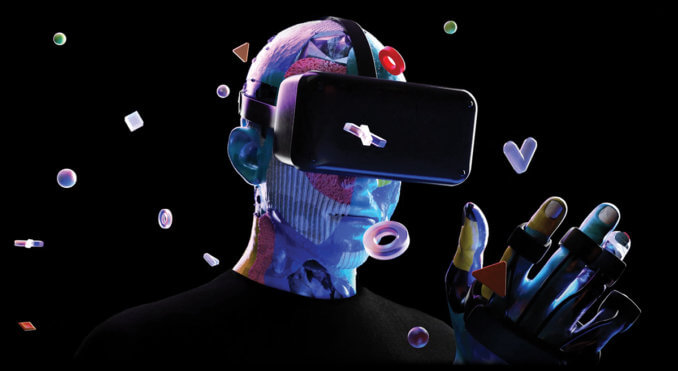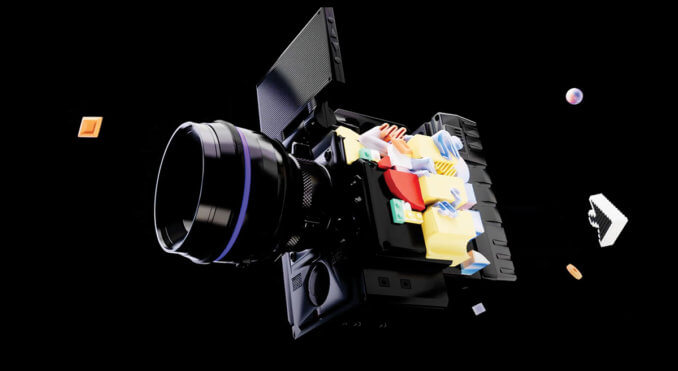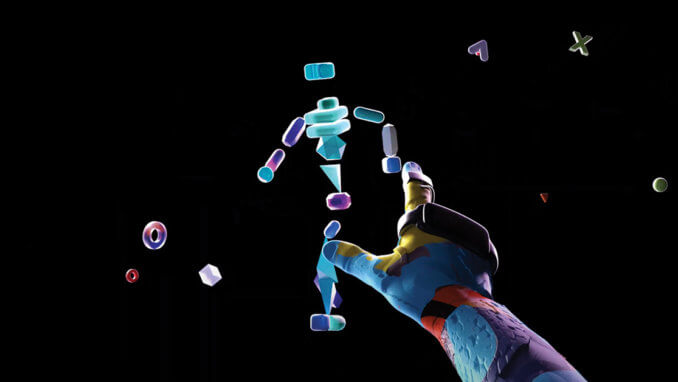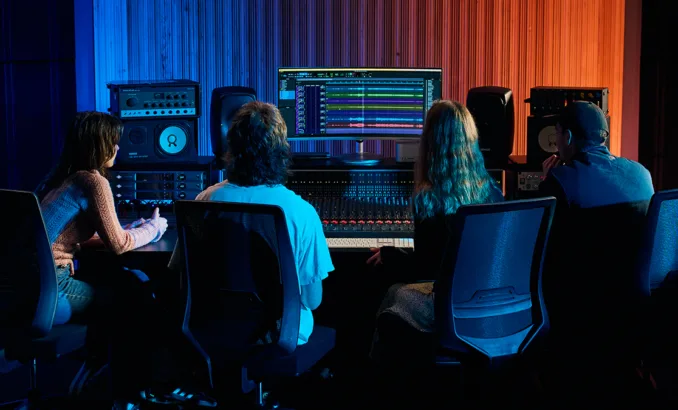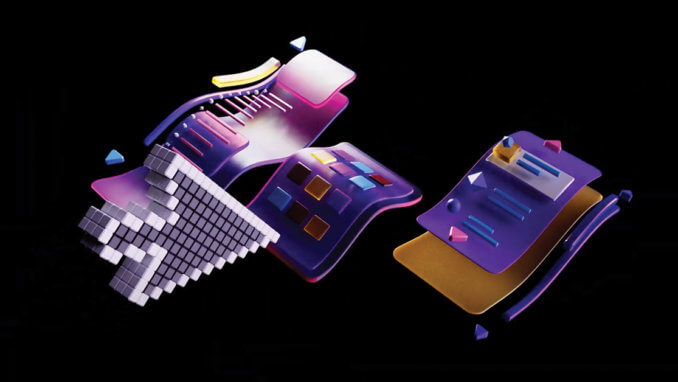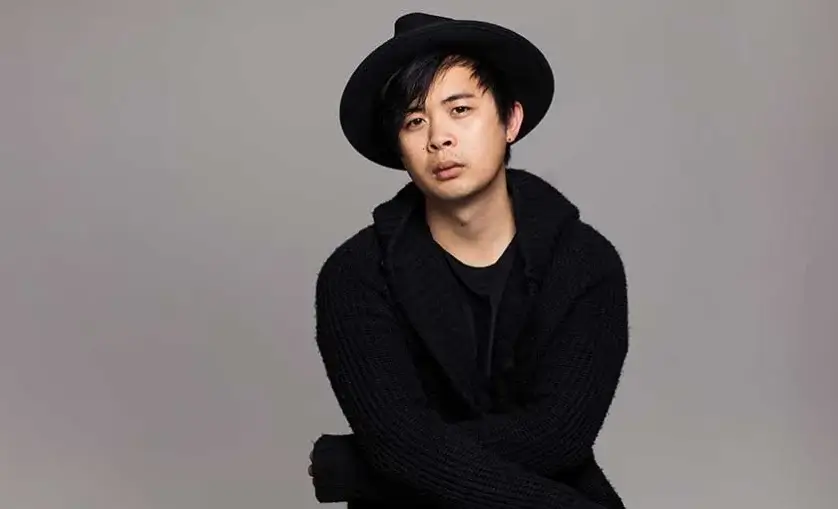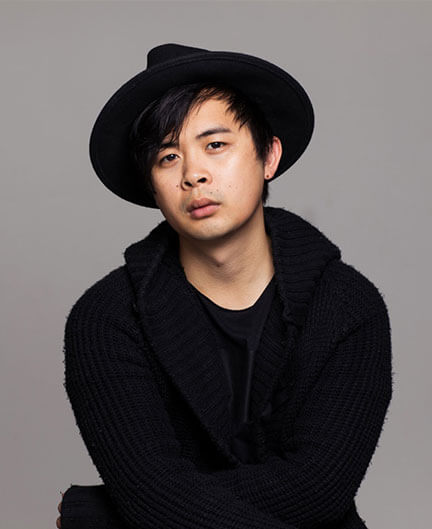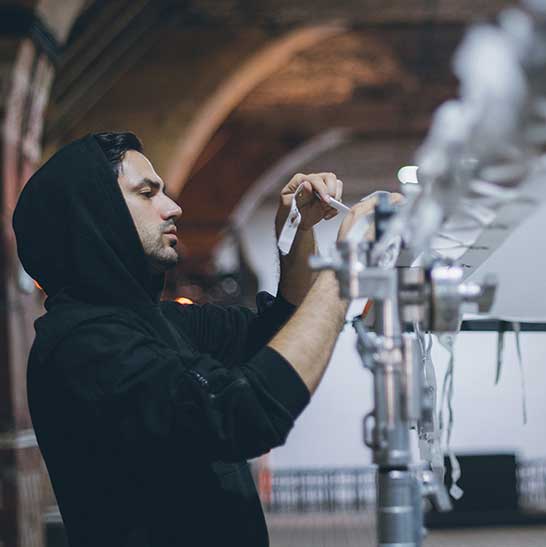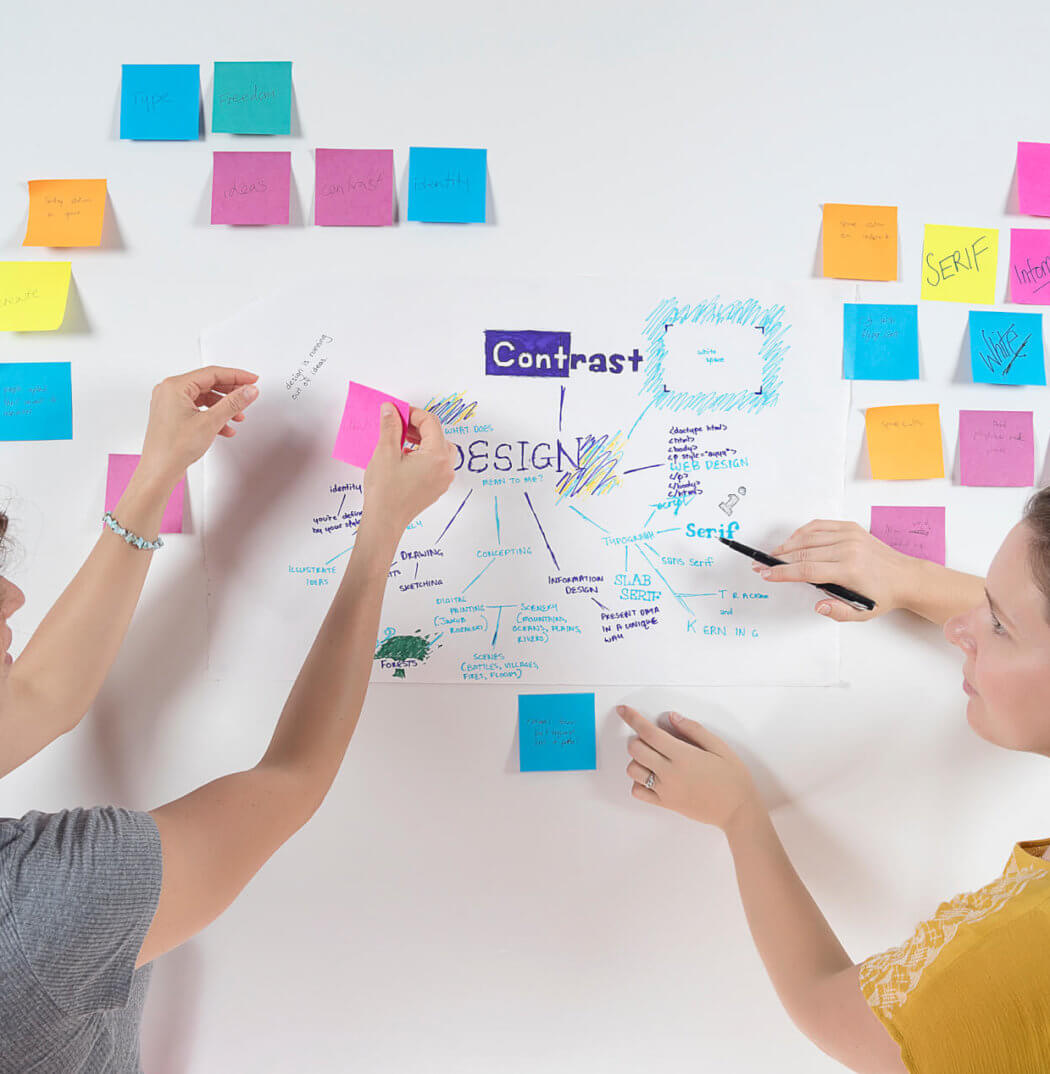Bachelor of Creative Industries
START YOUR JOURNEY IN CREATIVE MEDIA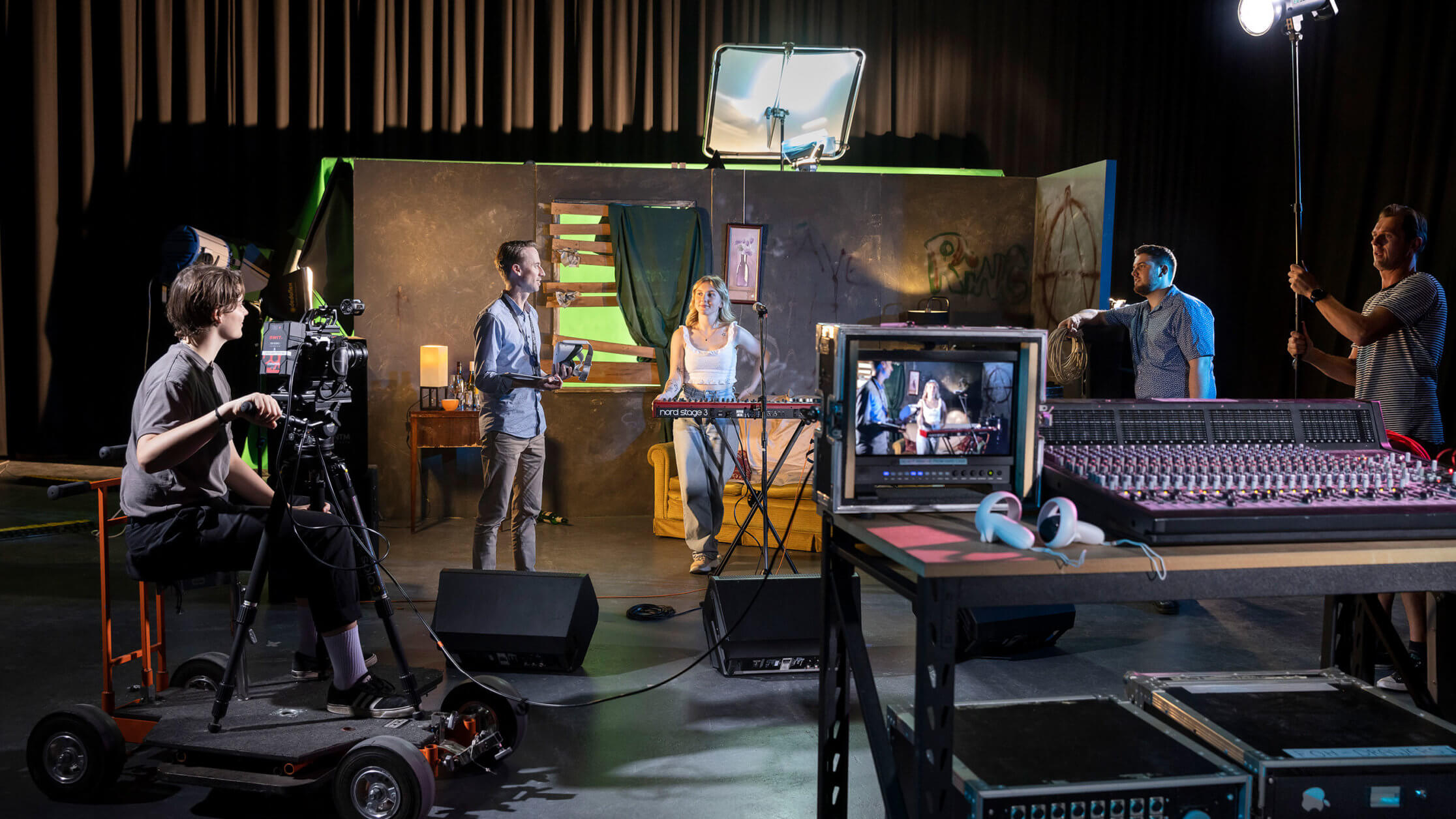
Units x Costs ($AUD)
7 x $3,807
11 x $2,728
3 x $5,456
Indicative Annual Course Fees*
(based on 1.0 EFTSL)
$28,298 AUD Year 1
$22,364 AUD Year 2
$22,364 AUD Year 3
Plus Student Services and Amenities Fee (SSAF)
Indicative Total Course Fee*
(based on 3.0 EFTSL)
$73,026 AUD
Plus Student Services and Amenities Fee (SSAF)
* The Indicative Total Course Fee & Indicative Annual Course Fees reflects that students are charged fees on a per unit basis and the fee for a unit may increase.
For more information view the SAE Fee Schedule or visit the Fee & Payment page.
Units x Costs ($AUD)
7 x $4,439
11 x $3,178
3 x $6,356
Indicative Annual Course Fees*
(based on 1.0 EFTSL)
$32,990 AUD Year 1
$25,424 AUD Year 2
$25,424 AUD Year 3
Plus Student Services and Amenities Fee (SSAF)
Indicative Total Course Fee*
(based on 3.0 EFTSL)
$85,098 AUD
Plus Student Services and Amenities Fee (SSAF)
* The Indicative Total Course Fee & Indicative Annual Course Fees reflects that students are charged fees on a per unit basis and the fee for a unit may increase.
For more information view the SAE Fee Schedule or visit the Fee & Payment page.
Complete your course faster by studying units across 2 years (6 trimesters).
Complete your course faster by studying units across 2 years (6 trimesters).
Complete the study units across 2.5 years. (8 trimesters).
Whilst still classified as a full-time study load, you will complete course units over a 3 year period (9 trimesters).
If you want to take a little longer, that’s ok too. We’ll help you work out the best study load to suit your needs.
Note: Part-time is not available for international students.
September 2024
February 2025
May 2025
September 2024
February 2025
May 2025
September 2024
February 2025
May 2025
September 2024
February 2025
May 2025
September 2024
February 2025
May 2025
September 2024
February 2025
May 2025
BACHELOR OF CREATIVE INDUSTRIES
The Bachelor of Creative Industries allows you to combine your skills across various media and creative technologies, preparing you for a diverse career pathway. The program brings together a variety of units across SAE’s disciplines in film, music, audio, animation, design, virtual reality, augmented reality, and games development.
Alongside specialist creative skills in multiple disciplines, you will craft your communication, project management, and entrepreneurial abilities. You’ll work with immersive audio-visual content, virtual and real events, and craft a self-directed industry-connected project, pushing you to think innovatively, creatively, and technically within a complex industry ecosystem.
With a Bachelor of Creative Industries, you’ll be ready for cutting-edge industry roles using modern creative business concepts and strategies. Career options include Digital Content Producer, Event Producer, Arts Administrator, or Multimedia Entrepreneur.
Students have the opportunity to cross-collaborate with students from all disciplines. The cross-collaboration of Creative Industries students with other Animation, Audio, Games Development, and Design students allows for highly sophisticated project-based learning and applications. Working with teams of diverse skills and backgrounds also simulates real-world industry and provides experience in project management and team management.
In addition to project-based learning, Bachelor of Creative Industries students are provided the opportunity to undertake workplace internships with companies in a variety of industries and work with industry mentors to develop career readiness.
Turn your creative passion into a profession with SAE.

Career Outcomes
What jobs will this course lead me into?
- Content producer
- Creative professional
- Digital project lead
- Digital content creator
- Arts administrator
- Creative project manager
- Entrepreneur
- Event producer
- Arts and Cultural Development Officer
What our students say about SAE
Why study a Bachelor of Creative Industries at SAE?
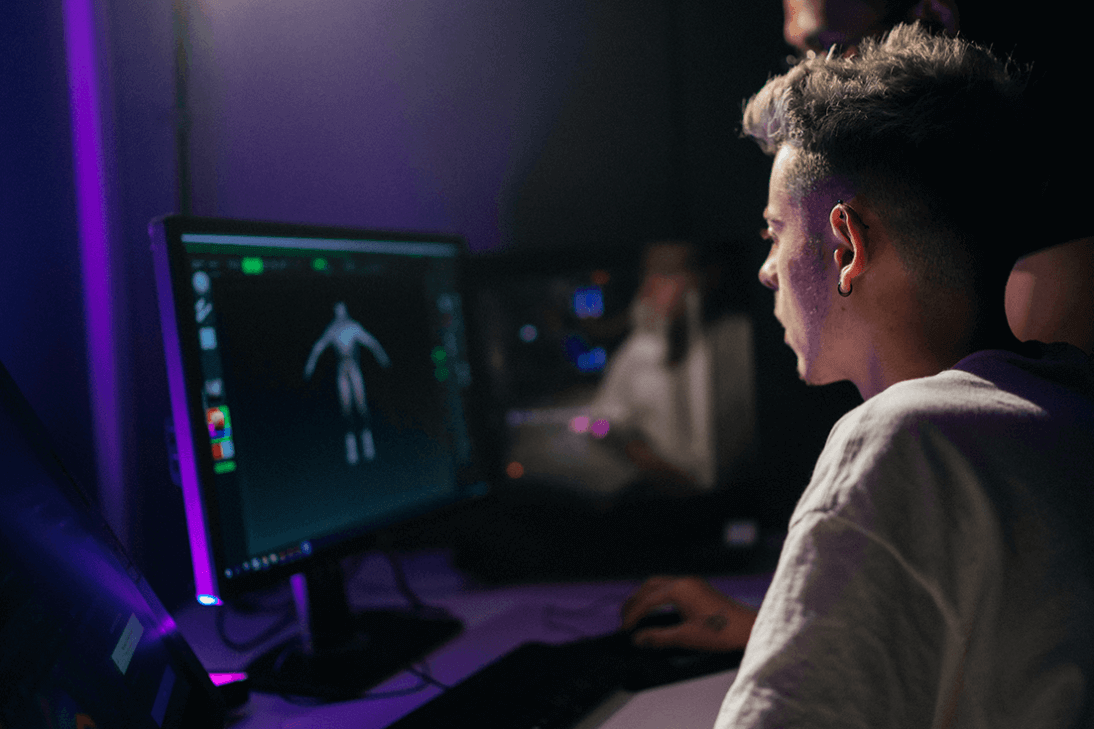
YOUR CREATIVE INDUSTRIES CAREER BEGINS NOW
Tools & Software


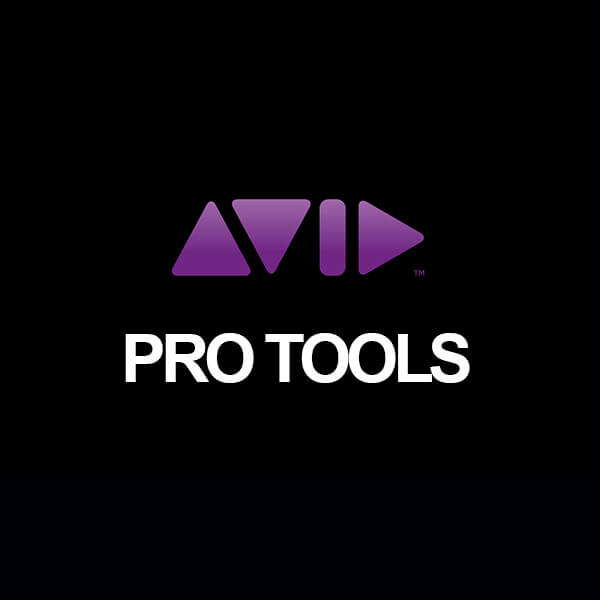


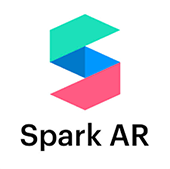

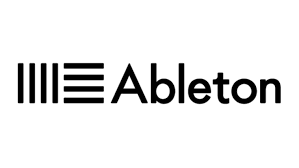
You'll explore
Course Structure
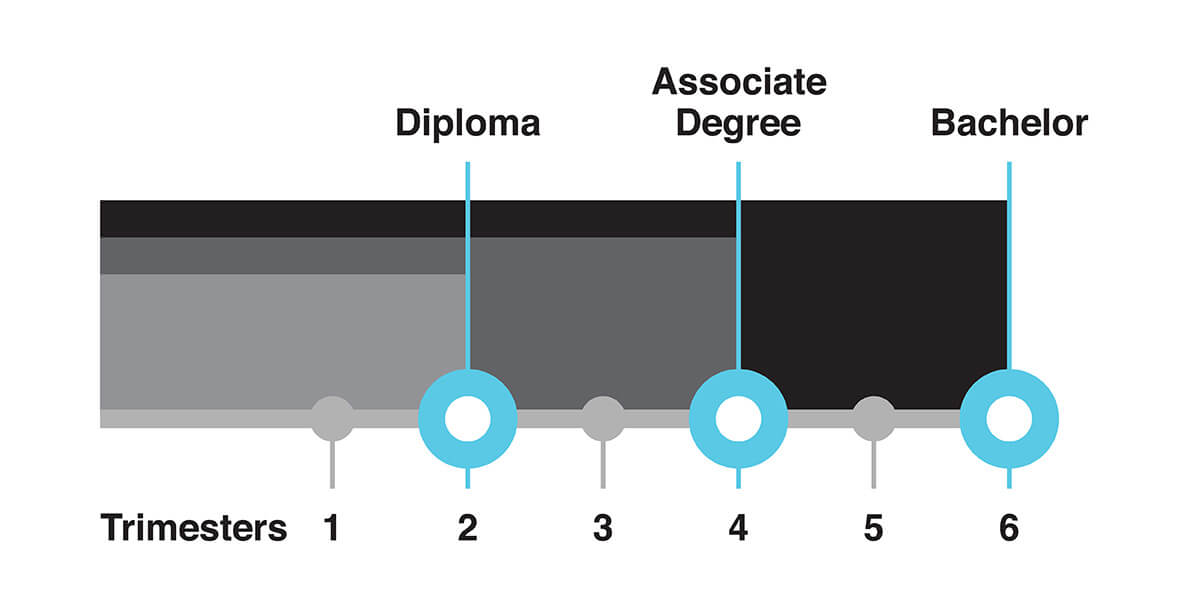
The skills and knowledge that you will acquire in this unit will assist you in understanding and developing the core communication skills used by entrepreneurs and practitioners across the creative industries.
This unit explores the concepts of entrepreneurship, innovation and project design. You will develop approaches to identify promising opportunities and actionable strategies to transform them into tangible successes. Through exposure to developing new ideas, processes and ways of working - both individually and in entrepreneurial teams - you will hone skills to put creative ideas into practice and achieve real-world impact.
As Alan Kay explained, "The best way to predict the future is to create it", so let's get at it!
This unit builds on project design elements introduced in the first trimester and focuses on core principles in project management. In this unit, you will act as project manager for your work or collaborate with others to develop robust systems and processes for projects. Through these practical projects, you will understand basic project management concepts allowing you to plan, initiate and execute ideas effectively.
To complement these concepts you will be introduced to core principles of ownership, copyright, and Intellectual Property (IP) as related to the Creative Industries, and how you can use marketing concepts involving storytelling & branding to connect ideas with audiences.
In CIM210 you will be working on interdisciplinary projects that relate to some of the most important concepts in contemporary media production. You will learn practical and analytical skills in order to help you develop your creative powers and meet briefs that take you out of your comfort zone. You will need to bring all of the skills you have learned so far: technical skills, research skills, communication skills and a growth mindset, and be prepared to encounter new concepts and new ways of working.
Throughout this unit, you will investigate relevant emerging technology such as NoCode, Augmented and Artificial Intelligence, and Machine Learning as they relate to your creative practice. You will have an opportunity to explore topics such as digital literacy, AR/VR, mobile delivery, digital folios, e-commerce, social media, and digital teams.
You will also experience discipline-relevant emerging technologies, including audio and video based applications, locative media, visual and open-source programming principles, and AI-driven multimedia - depending on your interests and chosen creative media specialism.
Media and culture are not simply entertainment, but something that affects the “real world”, our everyday lives, and our worldviews. As such, we will not ask whether media accurately reflect the real world but instead ask how media shape, reinforce, and challenge power structures that influence our understanding of the world and ourselves. This unit takes a ‘critical theory’ approach to analyze media and culture. In this unit, you will explore media texts, contexts and meaning, society and subjectivity, pop culture aesthetics, and critical cultural discourses that inform creative media practices.
Drawing on a range of creative content and analytical frameworks, you will be encouraged to develop ways of thinking about media and culture that demonstrate a broad awareness of aesthetic principles and stylistic trends; subjectivity, agency, ethics, and relations of power; contexts, disciplines and discursive formations. In support of this exploration, you will produce a range of media artifacts that explore and contextualize the relationship of media to culture through individual analysis, collaborative and interdisciplinary creative practice, and critical reflection.
As a creative practitioner, your ability to engage in interdisciplinary creative activity will transform your approach to media creation. In this unit you will use your various media skills to create multi-sensory approaches to real experiences for audiences, crafting work that allows your audience to feel, see, hear and experience something different.
You will develop skill and understanding of what interdisciplinary collaboration involves, how immersive experiences and the experience economy works, and the steps to take to create a physical multimedia experience. You will focus on practical elements including projection mapping for spaces and video mixing, audience engagement through sensors and triggers, audio integration, and the stages of planning, marketing and execution of an experience for a defined audience and client.
You will also be challenged to apply your discipline skills in new contexts using remote practice, digital communication, cross-discipline collaboration, and creative marketing.
Your skill as an original content maker will allow you to work across a wide range of industries and projects, in media connected to creative industries disciplines, or for a broader range of fields.
As part of your core skill set, understanding imagery and how it is created and edited is fundamental to work across the disciplines.
In this unit, you will explore photography techniques and the use of imagery in Augmented Reality contexts. You’ll use a range of cameras and consumer hardware, including your phones, and process images using software such as Adobe Express, Adobe Photoshop and Lightroom.
Further to this, you will investigate the contemporary application of Augmented Reality, developing an AR project to enhance the physical experience for an audience.
You will also be challenged to apply your discipline skills in new contexts using remote practice, digital communication, cross-discipline collaboration, and creative marketing. This unit requires you to think conceptually, using entrepreneurial frameworks to identify and realise agreed project outcomes.
In this core Creative Industries unit you will work collaboratively with your peers on interdisciplinary projects with a focus on contemporary technological concepts for a real creative industries digital production.
The topics in this unit drive you to respond to real-world situations and address concepts of community connection, commercial entrepreneurship, and digital events. Your creative work will engage with designing and crafting virtual or hybrid events that are artist and community-focused, socially relevant, value-driven, and technologically integrated. Throughout this unit there is a focus on the creative, technical and project management aspects required to deliver a cohesive and engaging hybrid or virtual event. You will conceptualise, plan, develop, market, execute and reflect on your event using contemporary technologies, artistic content and authentic audiences.
Throughout this unit your facilitator will act as your mentor, colleague and executive producer. You will build on the skills gained in earlier units to collaborate with your peers from other disciplines and/or campuses and external clients.
Storytelling as a deliberate creative and communication process forms a key element of this unit and is emphasised in conjunction with mentorship and the development of your capstone project. With guidance from your facilitator, peers and industry mentor you will plan the scope, structure, milestones and deliverables of your final capstone project.
Further, you will investigate fundamental components of storytelling and develop techniques to communicate effectively and compellingly with your mentor, your audiences, peers and communities of practice.
In this unit, students will take the project plan and pre-production work (developed in CIE317) and adopt a quality framework that will lead to the publication and exhibition of a final folio piece. Students will work with a project supervisor to achieve their project objectives.
Students will work towards the publication of a final deliverable evidencing proficiency in their personal, process, and product skills.
Using social media and digital content effectively is crucial for creative media professionals. In this unit you will develop an understanding of what constitutes social media, the activities that it consists of and how creators and audiences connect, collaborate, create, and share content. You will link this understanding with concepts of digital marketing, formulating strategies for social campaigns with a range of content across platforms. These skills will assist you to determine how social media can be utilised in your professional practice
The aim of this unit is to introduce you to the core business structures, management frameworks and marketing strategies used by contemporary creative professionals. You will discover the key behaviours and practices of successful creative business people and the business principles they implement – strategies you can use in your own professional practice. This knowledge will assist you in effectively exploring your creative business niche, encouraging you to develop and operate as a sustainable professional within your chosen media field. Through an examination of marketing strategies and processes, you will be able to identify and target specific consumers and markets. You will then research and develop a product- or service-based business that meets the demand within these target markets. You will also develop fundamental marketing, promotional, communication, and financial skills essential to running a creative media business as well as exploring start-up methodologies and structures within the creative industries.
The transition from study to work is an important step for you as an emerging professional in the creative industries. Work Integrated Learning provides you with a professional experience opportunity that both complements and deepens the skills and knowledge you have gained from study. Placement requires a minimum of 80 hours at one or more host organisations.
As a practice, drawing provides a core skill set for the expression of both concept and form. This unit introduces you to the concepts and methodologies of drawing using a variety of media with an emphasis on drawing from life, including anatomical studies and perspective techniques for environment and character construction.
The unit is an introduction to the general practice of drawing and rendering and specifically helps to scaffold further learning through support for developing sketch-based visual production skills & knowledge.
Take a practical first look at modeling, lighting, shading, animation, and rendering to gain a holistic, foundational understanding of computer graphics.
This unit will involve using industry-standard software such as Autodesk 3Ds Max, Maya, and Blender. The practical and theoretical knowledge of 3D production pipelines acquired in this unit will act as a foundation for successive animation units.
As the name suggests this unit provides you with an introduction to animation. You will apply the theoretical underpinnings of animation processes via a range of practical explorations and critical analyses. This will provide you with a solid understanding of animation principles and methods that will form the foundation of successive animation units.
Establish a basic knowledge of the principles of sound, foundational acoustics, human hearing, perception of sound and the range of technical terms related to audio. You'll sonically assess a listening environment and be able to communicate your ideas using industry terminology.
Potential projects:
Improve the acoustic properties of a home studio setup. Using technology analyse the sound of different rooms.
Gain the audio recording skills required to operate studio equipment and a Digital Audio Workstation (DAW) system by undertaking simple recording and mixing projects.
You'll be able to demonstrate an understanding of session planning, studio etiquette, microphone placement, signal flow, multi-track recording and signal processing (EQ, filters and dynamics processing) and be able to edit your session in preparation for mixdown.
Potential projects: Develop a plan for a professional recording session. Analyse sound recordings and create multiple mixes using balance, pan, equalisation, automation and FX processing.
In this unit you will learn about the principles of design through creating vector graphics in the form of motifs, pictorial marks and logos using Adobe Illustrator and other tools. Project briefs and activities in this unit introduce the principles of design; these are visual rules that can be applied in the creation of any image to enhance their impact, attractiveness and ability to communicate. The principles of design are useful and essential to your ongoing design practice
In this unit you will learn about illustration and the creative and technical production of digital images using photoshop and other tools. Working by hand and digitally you will explore a range of drawing techniques and tools including processes of iteration and refinement. You will investigate visual storytelling through the development of a series of images. Storytelling through your creative practice is essential to your ongoing design practice.
In this unit you will learn about designing page layouts for print through the combination of images and type. Your work will include the design of posters, brochures and flyers. You will investigate historical design styles; analysing, adapting and applying these styles in your work. You will explore the typographic art of arranging letters and words to make copy easy to read, visually appealing, and stylistically appropriate. Knowing how to use typography and layout effectively is essential to your ongoing design practice.
In this unit, you will be introduced to the principles of storytelling for the screen in the production of a short dramatic screenplay. Theoretical approaches to plot, structure, character, theme and genre will be explored, and applied to a range of screenplay development tools such as synopsis, treatment and character breakdowns. Through the analysis of a diverse range of mostly short films and the application of theoretical knowledge, you will develop the skills to create engaging character arcs and a satisfying story structure.
You will learn the techniques required to write effective dialogue and scene descriptions. As you draft your final screenplay, you will need to engage with industry-standard formatting and software programs. Feedback processes are essential in the development of engaging stories, and you are expected to engage with feedback from your lecturer and colleagues throughout the trimester.
In this unit, you will be introduced to the craft of filmmaking through participation in practical film shoots. An introduction to camera, lighting and sound equipment will be supported by a study of the fundamentals of frame composition and cinematography. Key roles and responsibilities of a working film crew as well as production processes and protocols are covered, including workplace health and safety. Familiarity with the equipment and its safe assembly and use is as important in this subject as the technical and creative elements.
This unit aims to instil a basic working knowledge of the structures, aesthetics and technologies involved in digital post-production. There is a particular emphasis on the editing process, as well as a general introduction to audio mixing, titling, colour grading and authoring processes within an industry-level non-linear editing tool.
Editing techniques and approaches vary between different mediums and this unit focuses on both documentary and drama workflows and file management protocols. Effective communication of narrative is the main focus of the unit, and you will learn to edit for narrative clarity, performance, subtext and dramatic effect. Historical and contemporary perspectives on montage theory and continuity editing theory will be explored to broaden your understanding and approach to the art of editing.
Game scripting is a common method of controlling the behaviour and sequencing of events and interactions within a game or scenario. Scripting can be thought of as a discrete language that uses principles of mathematics, combined with rules of syntax and patterns, to provide instructions for a computer to follow.
In this unit, you will implement a range of basic game functionality by utilising data manipulation, formulas, object creation, defining of behaviours, and working with event systems. You will also build an awareness of how to use these elements within common game scripting languages and environments.
Potential projects:
Build a simple game from scratch using an existing game engine such as Unity with C#.
In order to design and create games we need to be able to understand game systems and how they generate player experience. In this unit You'll break down existing games to identify and describe core elements and interactions of games. You will also engage with mathematical principles to inform and justify game design choices. This will involve both manipulating existing games and prototyping original game concepts and systems to generate player experiences.
Potential projects:
Through a process of iteration and testing, develop an initial modification of an existing game. You will then research and develop this concept into a suitably unique and standalone gameplay experience.
In order to design effective virtual reality experiences, you must understand the unique aspects of virtual reality. In this unit, you will identify and describe the core elements of virtual reality experience design. You will create prototypes that demonstrate these principles and observe and reflect on the results. You will work together in teams to produce prototypes and will be expected to document and reflect on the experience.
Managing Software Projects covers the key skills and knowledge required to work within software development projects as a paraprofessional. The unit simulates a real world creative media project in which you'll work under the supervision of more senior technical and executive staff, with a simulated client relationship.
High performance mobile computing technology, mobile sensor technologies, and modern real time rendering engines are facilitating a new wave of augmented reality applications in the market. This unit aims to provide you with the knowledge and experience to utilise these tools to understand augmented reality solutions designed for a wide variety of markets. Using a range of frameworks and prototype applications you'll apply augmented reality concepts and technologies to a range of needs. You will have an ability to understand and design for user embodiment of virtual and physical worlds.
This unit will help you develop the foundational skills to analyse a range of contemporary music styles, compose music effectively, and communicate musical concepts in different forms.
You will learn to identify music theory concepts including rhythm, harmony, melody, notation, structure, form, texture, and genre, and apply these concepts in your own analyses and creative work.
This unit introduces you to the core skills and concepts of music production. Across a range of projects, you will develop skills around recording, sampling, sequencing, and synthesis. You will develop your abilities across contemporary tools and technologies to produce original music in a DAW using a combination of MIDI and audio manipulation. You will also learn how to produce a variety of sounds to satisfy a brief and add effects to enhance the sonic qualities of your productions.
This unit aims to instil a working knowledge of the structures, aesthetics and technologies involved in digital post-production visuals and title design. There is a particular emphasis on compositing and manipulating the visual content within the frame, and the implementation of titles to footage. Influential cinematic, art and graphic styles, movements and techniques are analysed to give you a foundation in post-production visual aesthetics. The unit also deals with workflow, project management and interpersonal skills needed to export footage for a variety of delivery mediums and collaborating with creative clients.
As the name suggests this unit provides you with an introduction to animation. You will apply the theoretical underpinnings of animation processes via a range of practical explorations and critical analyses. This will provide you with a solid understanding of animation principles and methods that will form the foundation of successive animation units.
Games development uses assets from a range of creative sources including 3D models for environments and objects and 2D assets for menus and backgrounds. In this unit You'll gain an understanding of the production and implementation of these types of assets.
You'll gain practical experience with 3D modelling, lighting, shading, animation and rendering to gain a foundational understanding of a range computer graphics concepts. You will also reflect on the theoretical principles behind the development of computer graphics through critical analysis.
In this Unit, you will learn to understand the user or target audience as part of your design process through exploring UX (user experience) and UI (user interface) design. By applying UX design tools such as personas and user journeys and UI design such as prototyping, iterating and testing, you will explore creating websites or apps that provide an ideal user experience. Knowing how to do user research and design digital interfaces effectively is essential for a contemporary designer.
In this unit you will engage in a collaborative studio-based learning environment, to produce a short animation under client direction and in response to a brief. You will be guided through your exploration of the production methods needed to pitch effective creative concepts to potential producers.
By working in small groups (and in accordance with the SAE Group Work Policy), various creative and organisational challenges will be encountered throughout this process, requiring the application of appropriate project management techniques to help ensure the brief is successfully met.
Apply your acquired production skills in real-life audio, music or sound design projects, one ‘in the box’ and one in the recording studio.
You'll deliver to a brief, using production skills and researching comparable works to create well-rounded products through iterative processes.
Potential projects:
First project: Enhance an audio production using sequencing, sampling and synthesis for music composition or sound design project.
Second project: Working on a collaborative studio production, You'll apply project management skills to demonstrate effective use of time and resources, whilst documenting and reflecting on the production process, identifying areas for improvements and responding to feedback from your your classmates and facilitator.
This unit will simulate being in a real-world studio. Your designs will respond to larger project briefs with multiple deliverables, and you will engage in teamwork. This means time management, communication and scheduling will be crucial. You will learn to consider projects strategically in terms of your client’s brand or identity, and how these can be communicated visually and through associated text and structures. You are encouraged to explore and seek out new contemporary methods and tools for design and communication.
In this studio setting your facilitator will act as your project manager, producer, mentor and colleague.
This unit will be holistically assessed based on the criteria outlined in the unit guide. Teamwork, collaborative skills, and engagement with specific feedback processes are emphasised in this unit, as you further refine and reflect on a set of Transferable Skills.
This unit will give you the opportunity to develop a project from early ideation through to an industry-standard screen production. The purpose of this unit is to introduce you to procedures and protocols of screen production as well as further developing your skills in cinematography, lighting and sound. You will also be introduced to the pathway a screen production takes through the post-production stage to final delivery. A key outcome of this unit will be a screen production initiated and developed over the course of the unit.
In order to create games, you must be able to manage the complexity of the game development process. In this unit You'll build familiarity with toolsets and existing industry practices to formulate and execute clear plans for delivering games assets and features on time and of a high quality.
Work in a team to pitch, design, plan and deliver a game in response to a brief, where You'll extend your existing skill sets in design and scripting to craft a broader range of gameplay systems and features. This will involve learning and applying teamwork and organisational skills with your your classmates, as well as feedback, testing and iteration processes for the game itself.
Potential projects:
Work as part of a team to pitch, design, plan and deliver a game in response to a brief.
Music Studio 1 involves learning through the professional application of a range of songwriting and music production techniques. This includes working with external musicians to produce a recording, contributing to a sample library, remixing an existing track and working to a commercial client brief.
These activities will require you to be adaptive, respond to challenges you would expect while working on commercial productions, solve problems, be self-directed and successfully communicate with others.
Through working in these applied contexts you will deepen your knowledge of (re-)mixing, songwriting, and music production professional practice, and responding creatively to a fast-turnaround brief.
In this studio unit, you will work collaboratively on a series of projects set by briefs and led by your Facilitator. In collaboration with your your classmates, you will work towards developing several project milestones within a simulated studio environment with your Facilitator acting as your project manager, executive producer, mentor, and colleague.
Emphasis will be placed on advancing your development of the fundamentals of animation production through conceptualising, planning, and executing rapid animation productions, short films and contributing towards a portfolio. Working to a clear timeline, you will explore a range of skills and workflows in collaborative, cross-discipline, and individual work. This includes focusing on the creative, technical, and project management aspects required for completed animation production. Teamwork, collaborative skills, and engagement with specific feedback processes are emphasised in this unit, as you further refine and reflect on a set of Transferable Skills.
Work collaboratively on audio and music projects, responding to a brief and led by your facilitator. In collaboration with your your classmates, You'll work towards established project milestones within a recording studio project with your facilitator acting as your project manager, mentor, and colleague.
Further develop your production skills through conceptualising, planning and executing a project, employing recording studio hardware and software. You will adhere to a planned schedule and demonstrate professional practice in pre-production, production, mixing and mastering.
This process includes focusing on the creative, technical and managerial aspects required for a completed music project. Teamwork, interdisciplinary collaborative skills, and engagement with feedback processes are emphasised in this unit, as you further refine and reflect on your transferable skills.
Potential project
4-6 track original EP, recorded, mixed, mastered and ready for release, working closely with the artist to aim for the desired sounds, feels and sonic outcomes.
Like in Studio 1, this unit will simulate being in a real-world studio. Your designs will respond to larger project briefs with multiple deliverables, and you will engage in teamwork. Your teams may also include students from other disciplines or campuses. This means consideration of your teammates' cultural and industry contexts as well as thoughtful and conscientious time management, communication and scheduling will be crucial. Problem framing will be a key consideration in order to provide clear goals that will allow effective teamwork. You will learn to consider projects strategically in terms of your client’s brand or identity, and how these can be communicated visually and through associated text and structures. You are encouraged to explore and seek out new contemporary methods and tools for design and communication, and to enhance your existing skills.
Film Studio 2 acts as an introduction to a "real-world" environment that will allow you to experience the industry-standard production process in an accelerated capacity. This 30 credit point module will allow you to dedicate more time and energy to understanding and developing an individual and collaborative process. Your focus will be directed toward creating a fictionalised, scripted product that may comprise: short films, television commercials, web series, etc., whilst working in a collaborative and inclusive film crew.
In this unit, you will be assigned to a project team, which is led by a facilitator. In collaboration with your peers, you will work towards developing a number of projects within a simulated studio environment. During this process, your facilitator will act as your project manager, producer, mentor and colleague.
Film Studio 2 acts as an introduction to a "real-world" environment that will allow you to experience the industry-standard production process in an accelerated capacity. This 30 credit point module will allow you to dedicate more time and energy to understanding and developing an individual and collaborative process. Your focus will be directed toward creating a fictionalised, scripted product that may comprise: short films, television commercials, web series, etc., whilst working in a collaborative and inclusive film crew in a post-production capacity.
In this unit, you will be assigned to a project team that is led by a facilitator. In collaboration with your peers you will work towards developing a number of projects within a simulated studio environment, in a post-production context. During this process your facilitator will act as your project manager, producer, mentor and colleague.
Game design and development relies as equally on knowledge and skills, as it does on the eureka moment of creative design inspiration.
In this unit, you will ideate and develop one or more game prototypes. You will test these against criteria for success and identify the best prototype.
You will develop this prototype further, exploring more advanced game design techniques and evaluate them with an audience.
Potential projects: In collaboration with Audio and Animation students you will work towards developing a number of projects within a simulated studio environment.
Game development relies on processes and patterns to solve common problems that are well known to programmers. You will undertake these processes and evaluate common programming patterns that are core to the development of games. You will also explore more advanced mathematics techniques that are utilised in common game-engine systems.
With your facilitator acting as your project manager, mentor, and colleague, in this studio unit, you will further develop your songwriting and music production skills through screen media, topline, and film trailer music projects.
Responding to a brief in collaboration with your your classmates you will work towards established project milestones as you work on songwriting and music production projects. You will adhere to a planned schedule and demonstrate professional practice in remixing, emulation of styles, songwriting and music production. This process includes focusing on the creative, technical and managerial aspects required for a completed music project.
Teamwork, interdisciplinary collaborative skills, and engagement with feedback processes are emphasised in this unit, as you further refine and reflect on your transferable skills.
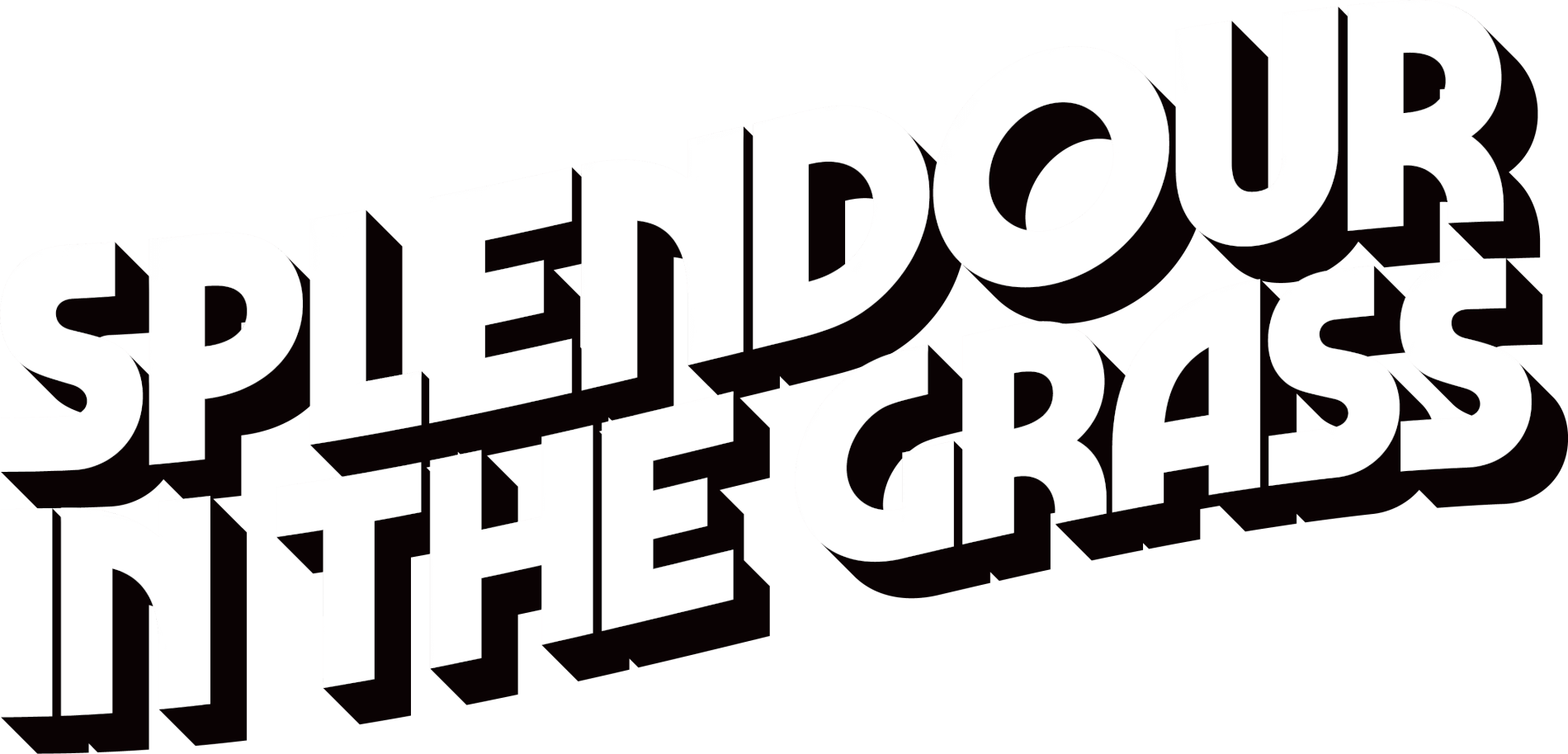
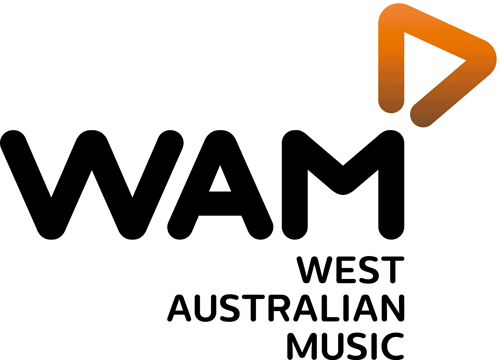


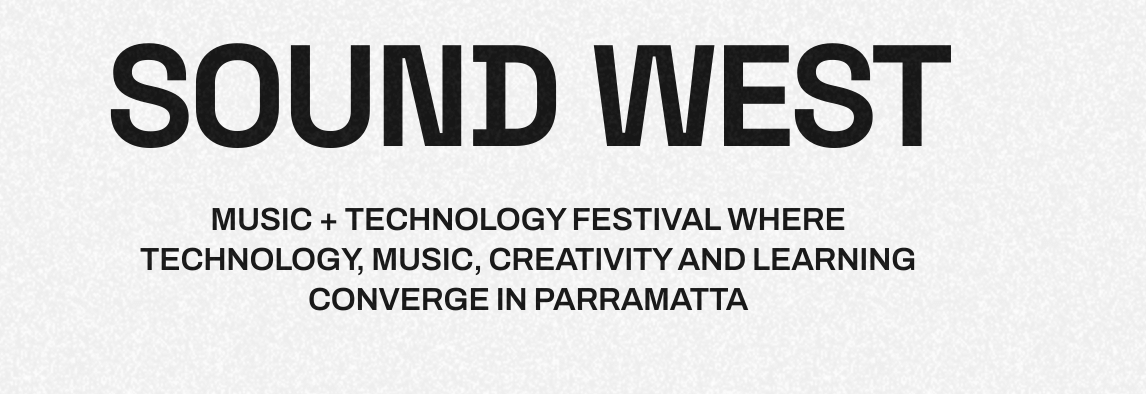
FEE‑HELP* is an Australian Government loan scheme that assists eligible fee paying students pay all or part of their tuition fees. It cannot be used for additional study costs such as accommodation or text books. The total amount of FEE‑HELP a person can use is known as the ‘FEE‑HELP limit’.
Once a person begins using FEE‑HELP, the amount of FEE‑HELP they have left to use is known as their ‘FEE‑HELP balance’.
* Terms and conditions apply. For the latest updates regarding FEE-HELP please refer to sae.edu.au/fees
You can choose to study most of our courses in a part-time capacity. An SAE course advisor will be able to give you more information about the study options for your chosen course.
Note: Part-time is not available for international students.
CREDIT AND RECOGNITION OF PRIOR LEARNING
SAE may recognise your prior learning and may grant credit towards satisfying the requirements for a higher-level program. This is applied where previous learning is considered equivalent to the content and learning outcomes prescribed for units within the program.
For full details, please refer to SAE's policy on recognition of prior learning and credit transfers.


